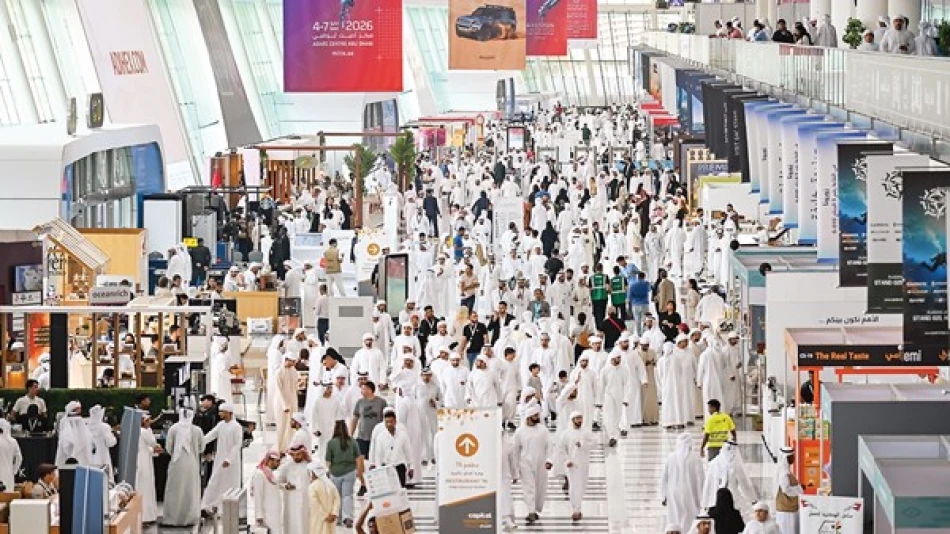
Abu Dhabi's Hunting and Equestrian Club: Preserving Heritage and Promoting National Identity
UAE Heritage Takes Center Stage as Abu Dhabi Hunting Exhibition Breaks Records
The 22nd Abu Dhabi International Hunting and Equestrian Exhibition has evolved beyond a commercial showcase into a powerful cultural institution, generating record-breaking sales of AED 1.77 million in camel auctions while positioning the UAE as the region's premier guardian of traditional heritage. Under the patronage of Sheikh Hamdan bin Zayed Al Nahyan, the event demonstrates how traditional practices can thrive in modern contexts, offering both economic opportunities and cultural preservation.
Cultural Diplomacy Through Traditional Sports
The exhibition serves as a sophisticated form of cultural diplomacy, attracting participants from across the Gulf, Arab world, and international markets. This positioning mirrors successful cultural preservation strategies seen in countries like Japan with traditional martial arts or Scotland with Highland games, where heritage becomes a soft power tool.
The event's ability to draw diverse international participation while maintaining authentic Emirati identity reflects the UAE's broader strategy of cultural openness without dilution. Local and regional companies specializing in falconry, equestrian sports, and traditional crafts use the platform to demonstrate shared cultural values across Gulf societies, reinforcing regional unity through common heritage.
Economic Impact Beyond Tourism
For investors and cultural economy analysts, the exhibition represents a mature heritage tourism market. The record-breaking camel auction results—with individual animals selling for up to AED 500,000—indicate robust demand for authentic cultural experiences and traditional livestock breeding programs.
These figures suggest the UAE has successfully monetized heritage preservation, creating sustainable economic models that fund continued cultural programs. This approach contrasts with heritage sites in other regions that struggle with funding, positioning the UAE as a case study in profitable cultural preservation.
Next-Generation Heritage Transmission
The exhibition's educational components reveal strategic thinking about cultural continuity. Interactive programs teach sustainable hunting practices while balancing traditional hobbies with environmental conservation—addressing modern concerns while preserving ancient practices.
Rashid Mohammed Al Rumaithi, Director of the Abu Dhabi Heritage Authority pavilion, emphasized the authority's commitment to preserving both tangible and intangible cultural heritage. The pavilion features advanced anamorphic display technology, demonstrating how traditional content can be presented through cutting-edge methods to engage younger audiences.
Scientific Preservation Methods
The Advanced Scientific Group, established in 1990 under the late Sheikh Zayed bin Sultan Al Nahyan's guidance, employs advanced embryo transfer techniques to produce hundreds of distinguished camels annually. This scientific approach to heritage preservation ensures genetic diversity while maintaining traditional breeding excellence.
Such methodical preservation efforts position the UAE ahead of other countries where traditional animal breeding faces challenges from modernization and urbanization.
Record-Breaking Camel Market Performance
The 52nd Arabian Camel Auction achieved exceptional results, with total sales exceeding AED 1.77 million. The highest-selling female camel reached AED 500,000, while other premium animals sold for AED 200,000, AED 160,000, and AED 140,000 respectively.
These price points indicate a sophisticated market with discerning buyers who value genetic lineage, racing potential, and breeding capabilities. The auction attracted hundreds of bidders from across the region, suggesting strong cross-border demand for UAE-bred camels.
Market Analysis and Investment Implications
The camel market's performance reflects broader trends in luxury traditional assets. Similar to classic car auctions or purebred horse sales, high-quality camels represent both cultural investment and potential sporting returns through racing competitions.
The transparent auction procedures and strict bidding controls establish market credibility, essential for attracting serious international buyers and maintaining price stability.
Educational Programming and Cultural Transmission
The National Academy for Childhood Development's pavilion runs daily activities through September 7th, focusing on Arabic-language programming. Dr. Amer Al Ali, Director of Partnerships and Communication, explained that participation aims to instill skills, revive values, and strengthen identity reflecting the UAE's vision of family empowerment.
The "Ulfa" program targets parents, teachers, and specialists with workshops on positive parenting, child interaction skills, mental health support, and family management. The national summer program "Generation 71" offers children workshops on national values and life skills, including hospitality arts and values of belonging.
Publishing and Documentation Efforts
The UAE Falconers Club released a special 224-page edition of "Al-Saqar" magazine, featuring over 100 heritage, cultural, and scientific articles across 34 diverse sections. The publication covers global falconry developments, species conservation research, and interviews with local and international experts.
Majed Ali Al Mansoori, Secretary-General of the UAE Falconers Club, emphasized the magazine's role in highlighting achievements that reflect falconry's status as ancient cultural heritage extending from past to present and future.
Traditional Crafts and Modern Commerce
The hunting knives sector attracts heritage enthusiasts and traditional hunting sports enthusiasts, with these tools carrying centuries of historical legacy. Specialists Mohammed Nadeem, Shakib Ali, and Alexander noted that traditional hunting knives served multiple functions in desert life, from food preparation to daily necessities.
The organizing committee established a "Best Hunting Knife" competition for individuals and companies, evaluating knives based on quality, durability, ease of use, and creative design connected to Emirati heritage. Competition rules require knives manufactured in 2023 or 2024, with rust resistance, safety, and practical hunting functionality.
Regulatory Framework and Safety Measures
The exhibition implements strict procedures governing knife sales, including age restrictions and delivery protocols requiring knife handover outside exhibition halls upon departure. These measures balance cultural preservation with modern safety requirements, demonstrating responsible heritage commerce.
The UAE's approach to heritage preservation through commercial viability, educational programming, and international engagement offers a replicable model for other nations seeking to maintain cultural identity while embracing modernity. The exhibition's continued growth and record-breaking results suggest this strategy will likely influence heritage preservation efforts across the region.
Most Viewed News

 Layla Al Mansoori
Layla Al Mansoori






